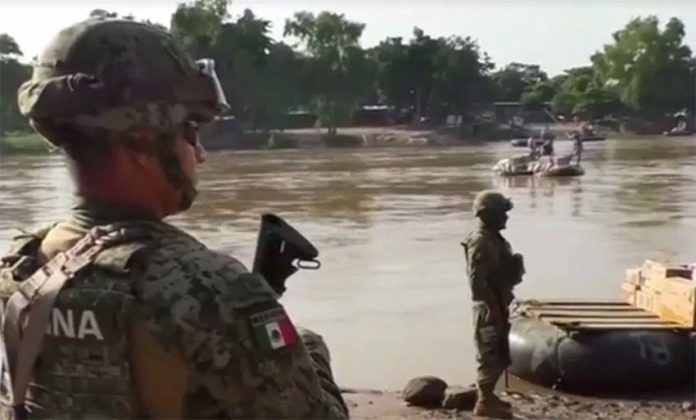Mexican soldiers found themselves outnumbered and outmaneuvered in a confrontation with smugglers and informal merchants at the Suchiate river on the Mexico-Guatemala border on Sunday.
As part of the new deal between the United States and Mexico to avoid President Donald Trump’s threat to impose blanket tariffs on all Mexican goods, soldiers, marines, Federal Police and the National Guard have been deployed to the southern border to stop the flow of migrants entering the country through Guatemala.
According to various news outlets, forces have begun regular patrols in Chiapas in the cities and towns of Tapachula, Comitán, Comalapa and Ciudad Hidalgo and along the river. On Sunday morning, they met with the first serious challenge to their authority.
At 9:00am, a small patrol of marines confronted a group of merchants as they secured articles meant for sale aboard a makeshift raft and prepared to cross the river. The marines warned that without proper documentation, the group’s merchandise would be classified as contraband and confiscated.
News of the marines’ threat spread quickly among other merchants who were also preparing to cross the river, and soon a group of 20 was shouting at the soldiers, angry at the prospect of seeing their sales hindered.
“Get out of here or we’ll burn your vehicle,” cried one.
In the face of the verbal onslaught, the marines gripped their automatic rifles nervously and watched the merchants’ advance across the river before finally climbing into their patrol vehicle and driving away, reported the newspaper El Universal.
The merchants, called balseros for the makeshift rafts used to transport merchandise across the river to avoid duties, say they have seen business suffer because of Mexican authorities’ crackdown on illegal entry into the country.
However, informal merchants, business owners and even local government officials concurred that, despite their illegal nature, local economies on both sides of the border and the jobs of thousands depend on informal commerce such as that carried out by the balseros, who frequently transport migrants across the river as well.
Loyda González, the manager of a store in Ciudad Hidalgo, said his business relies heavily on goods smuggled across the river.
“Yes, well, right now about 80% of the business here is from Guatemala.”
Shortly after the marines withdrew from the brief confrontation at the river, Suchiate Mayor Sonia Eloína Hernández Aguilar approached the merchants, who addressed her familiarly, to help them calm down.
She said informal jobs such as balseros, bicycle vendors, money changers and shop owners made possible by constant contact between border communities are the only economic opportunity for most of the region’s families, and that many would decide to migrate themselves if the informal economy were shut down by authorities.
The mayor was accompanied by Guadalupe Polanco, the leader of a group of balseros at another crossing on the river, who calculated that close to 500,000 people depend on informal border jobs for their sole income.
The mayor expressed support for the merchants and smugglers, who plan to present their case directly to President López Obrador and ask for special permission to continue their irregular cross-border trade.
Source: El Universal (sp), Televisa (sp)
